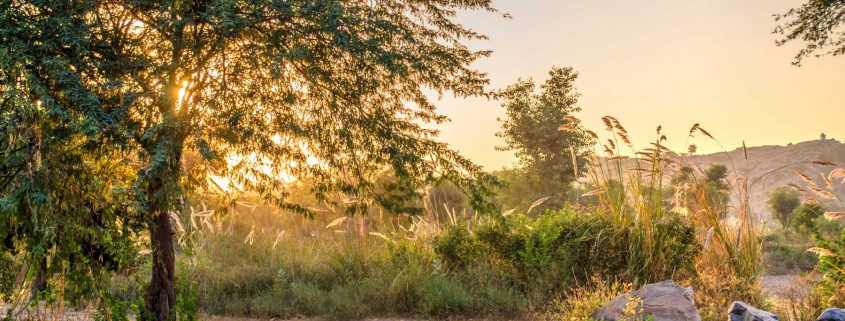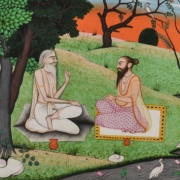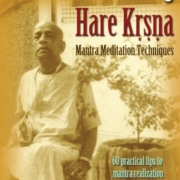How to Observe the Ananta Chaturdashi Vrata
Mahanidhi Madan Gopal Das
Although most Vaisnava calendars mention this vow, on this day Gaudiyas usually focus on worshiping Haridasa Thakura. Some also observe the tirobhava of Srila Kavi Karnapura. The Ananta Chaturdashi Vrata is not described in Hari-bhakti vilasa, but is observed throughout India with the utmost devotion and great festivity with lots of sweets and special prasadam dishes. For devotees desiring to observe this vrata, we offer the following suggestions based on sastra and the consideration of pure devotion.
What is the Ananta Chaturdashi Vrata?
Today, the fourteenth day of the bright fortnight of Bhadra (sukla chaturdashi, is the appearance day of Ananta Padmanabha, Lord Vishnu’s transcendental form reclining on the serpent Ananta floating on the sea. The Mahabharata describes how Shri Krishna advised Yudhishthira to observe the Ananta Vrata for 14 years in order to regain his kingdom after the Pandavas’ exile.
At that time, King Yudhishthira asked Sri Krishna what Ananta represents. In response, Bhagavan Sri Krishna showed His universal form, Vishvarupa, and said, “I am Ananta—endless time. You may call me Hari, Vishnu, Krishna, Shiva, Surya, Adi Shesha or Brahma. I am the Paramatma residing in the hearts of all creatures, and I descend in different forms to protect the righteous and punish the demoniac. In Me rest all the 14 lokas, 14 indras, 12 adityas, 11 rudras, 8 vasus, 7 rishis, the earth, sky, rivers and mountains.”
Sri Chaitanya Mahaprabhu visited the South Indian temple of Ananta Padmanabha and felt great bliss relishing the Lord’s darshana for three days consecutively, darshana anande dekhite. (Caitanya caritamrita 2.9.242)
What are the benefits of observing the Ananta Vrata?
The word ananta means endless, so following this vrata vow removes all the endless difficulties of material life. It is called a “kamya vrata” because it is usually observed to fulfill material desires; mainly to regain lost prosperity, glory or fame. It removes all difficulties, destroys sins, and protects one from all enemies. Devotees observe it with the desire to remove all the obstacles, inimical thoughts and inner difficulties which keep us from enthusiastically serving Radha-Krishna with pure love and devotion.
How to observe it?
Srila Prabhupada briefly stated how to observe it: “Because that is Ananta Chaturdasi Vrata, generally fasting is observed till evening, up to 5 o’clock.” (720311RC.VRN)
Rise early in the morning, bathe and take a sankalpa, a solemn promise or oath, to strictly follow this vrata. Sastra recommended one does it every year on this day for 14 years! Avoiding salt, eat only milk and fruits.
The main ritual is to prepare a cotton band of 14 individual threads or a string with 14 knots colored with kumkum and turmeric, and offer it to a picture of Lord Ananta Vishnu (see bbt sb 3.2), or a Deity of sarva-avatari svayam Bhagavan Sri Krishna. Then tie this string, the raksha-sutra, on the wrist (men:right; women:left) while chanting the mantra:
ananta sansar mahaa samudre,
magnan sam abhyuddhar vaasudeva,
ananta rupey vini yojitam mahya,
ananta rupey namoh namastute.
Worship the Lord with sandalwood paste, tulasi, a sumptuous bhoga offering and a full arotika with lots of fragrant flowers. Lord Ananta Vishnu especially likes sweet puris made of pumpkin. Accompany all aspects of the puja while chanting the mantra “Om anantay namoh namaha”.
Sastra says on this day one should also worship Sesha Naga and Yamuna-devi with bhoga, arotik and prayers. Prayers to Lord Balarama or Lord Nityananda (Nityananda Astakam) would suffice for Ananta Sesha since He is Baladeva’s expansion. And chanting Srila Rupa Goswamipada’s Yamunastakam would greatly please Kalindi Maharani and secure her divine blessings.
Yamunastakam
bhrätur antakasya pattane abhipatti-häriëé
prekñayäti-päpino api päpa-sindhu-täriëé
néra-mädhurébhir apy açeña-citta-bandhiné
mäà punätu sarvadäravinda-bandhu-nandiné
“May Yamunä-devé, the daughter of Sürya the sun-god, always purify me. One who touches Yamuna does not go to Yamaraja, her brother, and merely seeing her destroys all sins. The attractive blue water of the Yamuna captivates everyone’s heart.”
häri-väri-dhärayäbhimaëòitoru-khäëòavä
puëòaréka-maëòalodyad-aëòajäli-täëòavä
snäna-käma-pämarogra-päpa-sampad-andhiné
mäà punätu sarvadäravinda-bandhu-nandiné
“Yamunä-devé adorns Indra’s massive Khäëòava forest with her enchanting current, and upon her blooming white lotuses, birds such as wagtails always dance. Simply desiring to bathe in her crystalline waters frees one from the greatest of sins. May Surya’s daughter Yamunä-devé always purify me.”
çékaräbhimåñöa-jantu-durvipäka-mardiné
nanda-nandanäntaraìga-bhakti-püra-vardhiné
téra-saìgamäbhiläñi-maìgalänubandhiné
mäà punätu sarvadäravinda-bandhu-nandiné
“Sprinkling a drop of Yamuna upon oneself frees one from the greatest sin. Yamunaji increases the flow of devotion for Nanda-nandana within one’s heart and benedicts anyone who simply desires to reside on her banks. May Surya’s daughter Yamunä-devé always purify me.”
dvépa-cakraväla-juñöa-sapta-sindhu-bhediné
çré-mukunda-nirmitoru-divya-keli-vediné
känti-kandalébhir indranéla-vånda-nindiné
mäà punätu sarvadäravinda-bandhu-nandiné
“Yamunä-devé is so inconceivably powerful that although she flows through the seven oceans which surround the earth’s seven giant islands, she never merges into them as ordinary rivers do. Being an intimate part of Sri Mukunda’s wonderful pastimes, Yamuna-devi manifests those pastimes in the hearts of those who take shelter of her. Her dark, shimmering beauty defeats even that of a precious blue sapphire. May Surya’s daughter Yamunä-devé always purify me.”
mäthureëa maëòalena cäruëäbhimaëòitä
prema-naddha-vaiñëavädhva-vardhanäya paëòitä
ürmi-dor-viläsa-padmanäbha-päda-vandiné
mäà punätu sarvadäravinda-bandhu-nandiné
“Ornamented by the supremely enchanting land of Mathurä-maëòala, Yamunä-devé inspires spontaneous devotion in the hearts of the loving Vaiñëavas who bathe in her waters. With her waves, which are like playful arms, she worships Çré Kåñëa’s lotus feet. May Surya’s daughter Yamunä-devé always purify me.”
ramya-téra-rambhamäëa-go-kadamba-bhüñitä
divya-gandha-bhäk-kadamba-puñpa-räji-rüñitä
nanda-sünu-bhakta-saìgha-saìgamäbhinandiné
mäà punätu sarvadäravinda-bandhu-nandiné
“Yamunä-devé’s supremely attractive banks are further beautified by the celestial fragrance emanating from the flowers of the kadamba trees and by the presence of mooing cows. She is especially delighted when Nanda-läla’s devotees assemble on those banks. May Surya’s daughter Yamunä-devé always purify me”
phulla-pakña-mallikäkña-haàsa-lakña-küjitä
bhakti-viddha-deva-siddha-kinnaräli-püjitä
téra-gandhaväha-gandha-janma-bandha-randhiné
mäà punätu sarvadäravinda-bandhu-nandiné
“Hundreds of thousands of swans glide along Her waters. Yamuna-devi is worshiped by the demigods, siddhas, Kinnaras, and devotees of Sri Hari. Anyone who is touched by her gentle breezes is released from the cycle of birth and death. May Surya’s daughter Yamunä-devé always purify me.”
cid-viläsa-väri-püra-bhür-bhuvaù-svar-äpiné
kértitäpi durmadaru-päpa-marma-täpiné
ballavendra-nandanäìgaräga-bhaìga-gandhiné
mäà punätu sarvadäravinda-bandhu-nandiné
“Yamunä-devé distributes transcendental knowledge throughout the lokas Bhüù, Bhuvaù, and Svaù as she flows through them. Singing her glories burns to ashes the reactions of the greatest of sins. She has become supremely fragrant due to the sandal paste from Çré Kåñëa’s body melting in her waters as He enjoys His water-sports. May Surya’s daughter Yamunä-devé always purify me.”
tuñöa-buddhir añöakena nirmalormi-ceñöitäà
tväm anena bhänu-putri! sarva-deva-veñöitäà
yaù stavéti vardhayasva sarva-päpa-mocane
bhakti-püram asya devé! puëòaréka-locane
“Hey Sürya-putré! Devé! O Yamune, whose forceful waves are so purifying and who is surrounded by all the demigods! O Yamuna-devi, please increase the current of bhakti for Pundarika-lochana, who frees all from their sins, for that peaceful, intelligent person who recites this prayer.”
Ananta Padmanabha Swami ki jai!
Ananta Chaturdashi Vrata ki jai!
Jai Jai Sri Radhe!






Leave a Reply
Want to join the discussion?Feel free to contribute!